Lessons from the Covid-19 experience.
31 December 2022

Covid-19 provided us with the opportunity – and necessity – to learn new technologies, ideas, strategies and realizations. We adopted them and made them part of our work lives. It also tamed us enough so as to take on a more humanistic approach to our work, our customers, suppliers and staff. Espie Angelica A. de Leon speaks with lawyers about what they’ve learned about work, and life, since the pandemic began.
Where the Covid-19 pandemic is concerned, it was largely good news around the world in 2022.
The latter part of 2021 and early part of 2022 may have seen a dramatic rise in the number of cases due to the Omicron variant. But, a few months later, the numbers started to drop.
Hospitals began to see fewer Covid-19 patients. Restaurants, coffee shops, malls, cinemas and other service establishments began accepting more people. As they began taking off their face masks, more workers and students headed back to their workplaces and schools. Borders started to open and travel is back with a vengeance. Truly, life for most of us is significantly back to normal.
But surely, there are lessons to be learned from the Covid-19 experience.
Asia IP interviewed intellectual property lawyers and attorneys and came up with these lessons from the pandemic which business enterprises, including law firms and IP offices, ought to learn with regard to IP, data privacy and business operations:
IP plays a key role in innovation. The pandemic showed how a strong IP framework and IP rights are important in the exercise of protecting and enforcing such rights. Cross-licensing and technology transfer paved the way for better collaboration as well as sharing of proprietary technology and knowledge with business partners. The sharing of IP and insights for vaccine development during the pandemic, among others, proved this to be true.
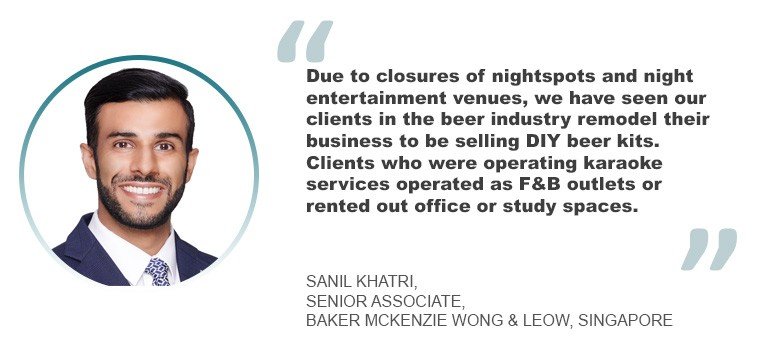
IP rights and ownership are extremely important. But so is knowledge sharing. “We saw knowledge sharing that allowed others to manufacture and access technologies that wouldn’t otherwise be accessible,” said Sanil Khatri, senior associate at Baker McKenzie Wong & Leow in Singapore.
“Businesses should consider when it is best to allow permission to use text and data mining and machine learning technologies. This includes the granting of licenses as appropriate to relevant parties to enhance value to the business and ensure IP right owners can maximize returns on their investments,” he added.
Manage IP portfolios more regularly and strategically. The Covid-19 pandemic drove many businesses around the world to experience forceful closures. However, those with effective, well-managed IP portfolios were able to leverage their IP assets and were rewarded with bigger revenues. These companies embarked on licensing, franchising and other transactions, thereby creating alternate revenue streams. Their ability to thrive even during a pandemic and survive a major global health crisis proves why it is imperative for a business enterprise to manage its IP portfolio more regularly and strategically.
Focus on increasingly dynamic consumer demands and needs. At the onset of the pandemic, companies saw the need for inventions that were appropriate for the times. Soon, IP law firms and IP offices saw rising numbers of patent applications in relation to contact tracing, telemedicine, vaccines against the Covid-19 virus, even cosmetic compositions for cosmetic products that don’t rub off or smear when facial masks are removed. Design filings for disposable facial masks, facial mask carriers, lanyards for attachment to facial masks and similar products increased as well.
Business reinvention and remodelling are crucial options. In some instances, new consumer demands and needs of the hour requires a company to rethink its business model and reinvent itself.
“In Singapore, we have seen how the Circuit Breaker and Heightened Alert Phases have affected our clients. Due to closures of nightspots and night entertainment venues, we have seen our clients in the beer industry remodel their business to be selling DIY beer kits. Clients who were operating karaoke services changed their mode of operation and operated as F&B outlets or rented out office or study spaces given the restrictions on entertainment services. Clients in the education sector conducted traditional face-to-face classroom sessions online, developing new education software and online education materials,” shared Khatri.
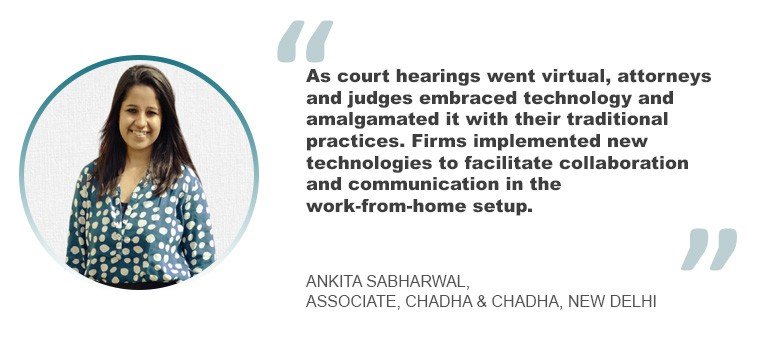
Embrace technology. Digitalization cannot be avoided. Lockdowns imposed by the Covid-19 pandemic forced a bulk of the global workforce to move away from their traditional offices and set up workstations at home. The lockdowns also forced offices to minimize face-to-face interactions and over-the-counter services. Court hearings also started to go virtual. Meanwhile, retail establishments which previously did not have a solid online presence finally strengthened their ecommerce footprint.
The upside was that people, including those who were previously clueless about modern technology, began to embrace it and soon became more tech-savvy.
“As court hearings went virtual, attorneys and judges embraced technology and amalgamated it with their traditional practices. Apart from familiarizing themselves with technology, they also devised new mechanisms to ensure smooth functioning of their practice. Existing IP firms were compelled to devise new mechanisms for office functioning. Moreover, firms implemented new technologies to facilitate collaboration and communication in the work-from-home setup,” said Ankita Sabharwal, an associate at Chadha & Chadha in New Delhi.
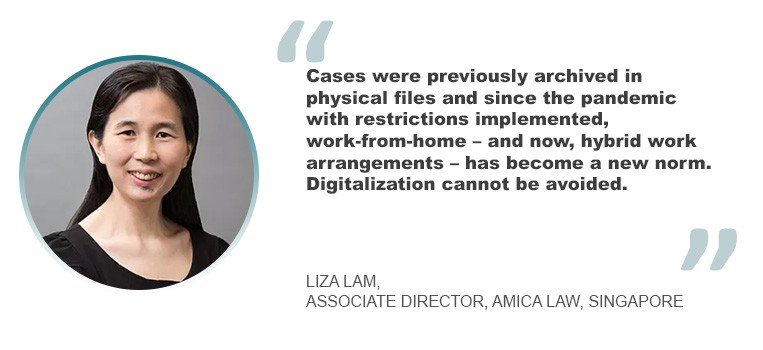
“Internally, a number of adjustments with respect to manpower, workflows and work modes were encountered,” added Liza Lam, associate director at Amica Law in Singapore. “At times, firms may face sudden manpower crunches such as increasing number of staff may be on sick leave at the same time. This does not help when the nature of IP work is generally time sensitive. Meanwhile, in terms of logistics, cases were previously archived in physical files and since the pandemic with restrictions implemented, work-from-home – and now, hybrid work arrangements – has become a new norm. As such, digitalization cannot be avoided.”
This scenario extends beyond law firms of course, and cuts across industries worldwide.
In the online space, IP differentiates one company from the rest. Sabharwal explained: “As most of the businesses transitioned from the traditional brick and mortar setups to the digital space owing to the Covid-19 pandemic, IP played an intrinsic role in differentiating businesses from others in the limitless virtual web space. This differentiation has been possible owing to diverse IP tools including trademark protection, domain name registration, copyright protection and others.”
Invest in safeguarding sensitive information. Remote and virtual working setups however, come with challenges such as those dealing with security and privacy. Thus, it is important to invest heavily on data protection tools and measures including software development, building and strengthening privacy policies, conducting data surveillance and others.
Invest in sophisticated tools to address counterfeiting. The explosion of ecommerce during the pandemic came with a surge in the number of counterfeit products being sold online. This compelled businesses to invest in sophisticated tools to tackle online counterfeits. Among these tools were QR codes for product identification, diligence mechanisms, among others.
When it comes to commercial IP transactions, the tangible world is still important. Ecommerce can only do so much as most industries cannot rely on online delivery of products or services.
Take food and apparel as examples. One can definitely order food items or a piece of clothing online. But, these items have to be delivered physically to the customer.
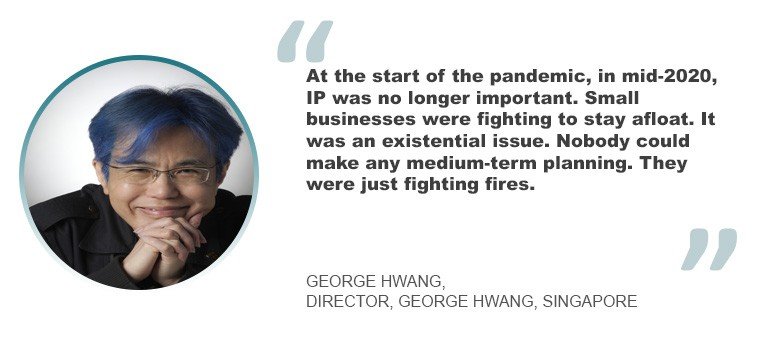
“Online purchase and offline delivery cannot be avoided. It made me appreciate logistics, administrative and other controls in the chain of supply,” said George Hwang, director of George Hwang in Singapore.
Citing a simple exclusive distribution agreement as example, Hwang explained: “As an IP lawyer, I used to emphasize the importance of trademarks and other IP, without which it will be near impossible to make an exclusive distribution deal. It can only be a sale of goods contract. But now, I appreciate the necessity of factoring the different ‘acts of God’ into the contract and the importance of the storage environment. The latter could be crucial for pharmaceuticals.”
During a crisis, explore cost-effective strategies. “With restricted client spending, IP attorneys moved towards exploring cost-effective and faster modes of dispute resolutions including arbitrations and transactional strategies. As the courts remained shut for long periods of time, attorneys formulated newer and creative strategies to seek the best remedies for their clients,” shared Sabharwal.
Pay attention to possible loopholes in contracts and agreements. “Moving forward, we do see more companies now emphasizing more care and considerations toward forming contracts and agreements in hopes of minimizing loopholes at the onset,” said Lam.
She explained that unforeseen circumstances related to the pandemic may have caused rising numbers of contracts and agreements which were voided or breached.
“Companies big or small may find themselves in unfavourable and unfamiliar situations, while others may still be still trying to resolve them even as we speak,” said Lam. “It is indeed a wake-up call from lessons learned from the pandemic.”
Compulsory licensing may be a concern, as echoed by pharmaceutical and biomedical enterprises. “For example, in Singapore, some companies and/or institutions may be involved in developing vaccines for the coronavirus, and/or test kits for detecting the coronavirus. These entities may be faced with situations where their IPRs may be subject to compulsory licensing and this may be a consideration that may have hindered quality of R&D work and perhaps even investments into R&D. To their relief, Singapore has yet to invoke any compulsory licensing in this respect,” said Lam.
IP is not the obstacle to innovation and R&D. According to Khatri, it is the availability of and accessibility to raw materials and limitation on manufacturing and distribution chains that are the real obstacles.
“IP in fact was an enabler for businesses to invest, develop and advance Covid-19 related technologies. If businesses have not already considered what IP requires protection throughout the pandemic,” he emphasized, “now is the best time to act to assess what is protected, what should be protected and what no longer requires protection.”
Build good relationships with the company staff, customers and suppliers. A strong relationship with customers and suppliers is important for the company’s long-term survival, enabling it to weather storms including a pandemic. Therefore, it would serve a company well if it takes on a more “humanistic” approach to business and contracts.
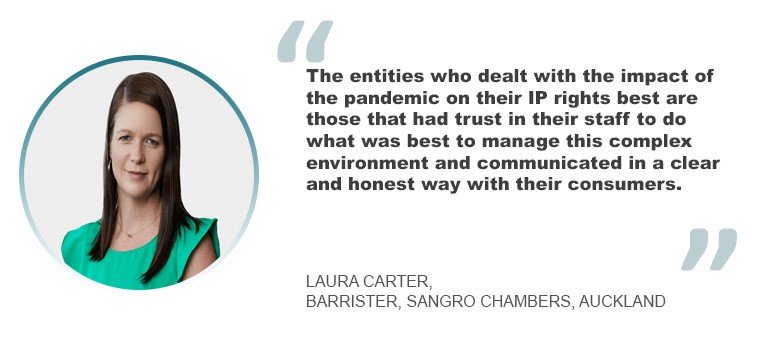
“In my view the entities who dealt with the impact of the pandemic on their IP rights best are those that had trust in their staff to do what was best to manage this complex environment and communicated in a clear and honest way with their consumers,” said Laura Carter, a barrister at Sangro Chambers in Auckland, “They were willing to be human.”
“Relationships – both external and internal – matter hugely,” Carter added, “as good, strong, and genuine relationships within organizations and with your suppliers and customers will help you be nimble enough to manage any challenges and take any opportunities that arise.”
In the legal practice, age and maturity are assets. Knowledge is one thing. Soft skills are another.
In the field of law, soft skills such as empathy, communication and negotiation techniques are just as important as knowledge. As a lawyer or attorney matures, he acquires these soft skills and strengthens his expertise over the years.
According to Hwang, in the midst of the pandemic, lawyers were dealing with a delicate situation and psychology for several months.
These qualities and skills are just as well needed in other fields of expertise, especially when crisis strikes.
IP and innovations by themselves could be mere distractions. “At the start of the pandemic, in mid-2020, IP was no longer important. Small businesses were fighting to stay afloat. It was an existential issue. Nobody could make any medium-term planning,” said Hwang. “They were just fighting fires.”
Some of these businesses, particularly those from the food industries, actually folded under the pressures of Covid-19.
This is not to say, however, that IP and innovation aren’t at all important during a pandemic. “The best IP and innovations,” Hwang revealed, “are those which contribute towards humanity.”
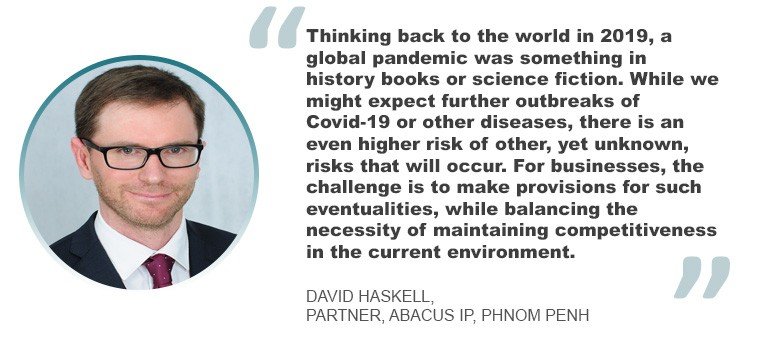
Expect the unexpected. For David Haskell, a partner at Abacus IP in Phnom Penh, this is the main lesson to be learned from the pandemic.
“The last decades of growth, particularly in a dynamic economy like Cambodia, led many to think that we would continue down that path indefinitely,” he said. “Thinking back to the world in 2019, a global pandemic was something in history books or science fiction. While we might expect further outbreaks of Covid-19 or other diseases, there is an even higher risk of other, yet unknown, risks that will occur. For businesses, the challenge is to make provisions for such eventualities, while balancing the necessity of maintaining competitiveness in the current environment.”
Carter agrees.
“Going forward, the key lesson that has been learned is that the world is unpredictable, and that those entities that have flexibility built in to the internal processes and external contracts are going to be the best placed to protect and utilize their IP,” she said, “no matter what comes down the line in the future.”
This includes the supply chain problems resulting from the pandemic and its accompanying lockdowns, she says.
Private corporations are stronger than governments. “From the point of view of sharing of IP to solve the crisis, I realized that private corporations are stronger than governments,” said Hwang, “when they come together and start sharing for the sake of humanity.”
What is legal and what is ethical became wider apart. According to Hwang, it is easier to tell the difference when making judgments and decisions in commercial transactions.
“What is legal would be the letter of the contract; for example, landlords insisting that tenants, especially restaurants and retailers, pay the rent stated in the tenancy agreement. This is before Covid-19 Temporary Measures Act. Another is the price of masks charged by some middlemen. Those who have the masks are entitled to state their price, legally. But when it became ‘extortionist,’” said Hwang, “is it ethical?”
As we look forward to 2023 and what seems to be the post-Covid-19 era, let us not just celebrate the fact that we have weathered a storm known to be one of the harshest periods that humanity had to endure.
Let us also celebrate the idea that the storm actually gave us sunshine.
Covid-19 provided us with the opportunity, and necessity, to learn new technologies, ideas, strategies and realizations. We adopted them and made them part of our work lives. Covid-19 trained us to have sharper minds, be more creative and imaginative when doing business. It also tamed us enough so as to take on a more humanistic approach to our work, our customers, suppliers and staff.
These are the very lessons of the Covid-19 experience that transformed us into better professionals and better human beings.
- Espie Angelica A. de Leon






